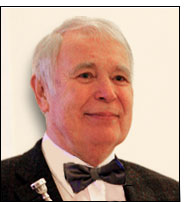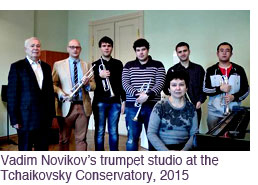 |
VADIM NOVIKOV: RUSSIAN PERSPECTIVES
BIOGRAPHY
Vadim Novikov was born in 1941 in Kolomna, Russia, an ancient city 71 miles (114 km) southeast of Moscow. Preliminary musical inspirations came from music in the home on radio, his father’s French horn playing, and local brassbands. Serious trumpet study began at the age of 14 at the Music College affiliated with the P.I. Tchaikovsky Moscow State Conservatory (MSC), where he studied with Sergei Yeryomin, who had accepted him as a student  outright without waiting for other exam results. outright without waiting for other exam results.
In 1959, at the of age 17 and with the encouragement, support and guidance of Russian musician and Baroque connoisseur Anatoly Knorre, Novikov recorded the Concerto for Trumpet and Orchestra by Giuseppe Torelli for Moscow Radio, playing the work on a C trumpet and accompanied by the Moscow Chamber Orchestra conducted by Knorre. The recording represented the first performance in Russia of a solo trumpet piece from the Baroque era, and was immediately released on Russia’s Melodiya Records label.
In that same year, Novikov was accepted as a student at MSC where he continued his studies with Yeryomin and began working as well withYuri Usov, then an associate professor at the school. At that time he was also invited to teach trumpet at the school’s Music College, where he had been a trumpet student for three years.
Performance: In 1962, having just completed his third year at MSC, Novikov entered and won first prize at the International Trumpet Competition in Helsinki, Finland, playing, among other things, the Hindemith Sonata for Trumpet and Piano, a compulsory work at the competition, and winning the prize awarded by the jury for the best performance of the piece. The Hindemith Sonata was, at the time, unknown in Russia, and Novikov gave its Russian premiere in a solo concert performed in Small Hall at MSC.
Upon graduation from MSC in 1964, Novikov began his 22-year tenure as a trumpet soloist with the Bolshoi Theater, sharing that role with Timofei Dokshizer, Naum Polonsky, Ivan Pavlov, and Ilya Granitsky. While at the Bolshoi he worked under Russia’s major conductors, including Svetlanov, Rozhdestvensky, Simonov, Zhuraitis, Lazarev, and Temirkanov. During this time he also performed with the Moscow Chamber Orchestra under Rudolf Barshai.
His solo career encompassed the years 1970 to 2012 (cut short by a car crash in the autumn of that year), during which time he performed and gave masterclasses in France, Germany, Austria, Spain, Switzerland, Italy, Great Britain, Estonia, Finland, Russia, Ukraine, and Lithuania.
During the Bolshoi Theater tour of 1967 he happened across the famous recording of Armando Ghitalla performing the Hummel Concerto for Trumpet with the Boston Chamber Orchestra under the direction of Pierre Monteux (Cambridge label, CRS 1819). On the opposite side of the disc were recordings of the trumpet concertos by Molter and Fasch. Inspired, Novikov purchased the album, bought two trumpets – a Selmer piccolo trumpet and a Selmer E-flat trumpet, and began to frame his goal of introducing Baroque trumpet literature and styles to Russia. His determination to do so was further whetted by his meeting with Maurice André in 1969.
Novikov’s premier public solo recital of Baroque music for trumpet played on high-pitched instruments was the first of its kind in Russia. Taking place in 1972 in Moscow Philharmonic Tchaikovsky Hall with organist Boris Romanov, it was followed by performances at Minsk Philharmonic Hall, the International Organ Festival in Tallinn, and in other cities around the country. The concerts featured Baroque compositions by Telemann, Gabrielli, Viviani, and Purcell, among others, along with standard trumpet works.
In 1979, Russia’s music publishing house, Muzyka, published a compilation by Novikov of early solos for trumpet, the first of its kind in Russia, containing works by Domenico Gabrielli, Vejvanovsky, Viviani, Walter, Telemann, and Purcell. In 1982 his edition of the Concerto for Trumpet by Haydn was published, and in 1984 Muzyka published a second Novikov compilation, this time containing works by Tessarini, Graupner, Martini, J.C. Bach and Valentino.
Despite several major medical setbacks, including nitrogen freezing of the upper lip to stem a major infection, Novikov was, over the years, able to recover and continue his successful playing and teaching career.
Teaching: Novikov began work as a faculty member at MSC’s Music College in 1959. In 1972, at the request of Timofei Dokshizer, he taught for two years at Moscow’s Gnessin Pedagogical Institute. Then, with Dokshizer’s blessing, he returned to the trumpet faculty at the Music College with the charge of preparing future students for MSC.
In 1979, as an established and important figure in Russian trumpet circles and an influential pedagogue, Novikov joined the MSC trumpet faculty itself, rising in rank to associate professor in 1984 and to full professor in 1993, a position he holds to this day along with his Music College position. Upon his appointment to MSC, he introduced Baroque music – and the high-pitched trumpets with which to play it – into the school’s trumpet curriculum. Most recently, Novikov has also been on the trumpet faculty of the Central Music School in Moscow.
Novikov has been credited with founding a highly successful contemporary Russian school of solo trumpet performance with a contemporary repertoire and a contemporary interpretation of old and new trumpet literature. Concerts by his trumpet classes are favorites among audiences and are important events in the Russian trumpet world.
Students from Novikov’s studio include winners of international competitions and soloists of the leading orchestras of  Moscow, including the orchestra of the Bolshoi Theatre, the National Philharmonic Orchestra, the State Symphonic Capella of Russia, the Tchaikovsky Symphony Orchestra, the Svetlanov Symphony Orchestra, and the Moscow Philharmonic. Novikov’s students can also be found performing and teaching in Sweden, Israel, the USA, South Korea and Germany. Moscow, including the orchestra of the Bolshoi Theatre, the National Philharmonic Orchestra, the State Symphonic Capella of Russia, the Tchaikovsky Symphony Orchestra, the Svetlanov Symphony Orchestra, and the Moscow Philharmonic. Novikov’s students can also be found performing and teaching in Sweden, Israel, the USA, South Korea and Germany.
Novikov is also founder and president of the Russian Interregional Trumpet Guild, created in 1995. With assistance from the International Trumpet Guild, Novikov organized three International Trumpet Festivals in Moscow (1995, 1998 and 2001) during which international solo trumpet competitions were held. The performance contests drew aspiring trumpeters from around the world, with winners representing the USA, Germany, Switzerland, Sweden, Belarus, and Russia (including students of Novikov). -- James Olcott
|
|
|

